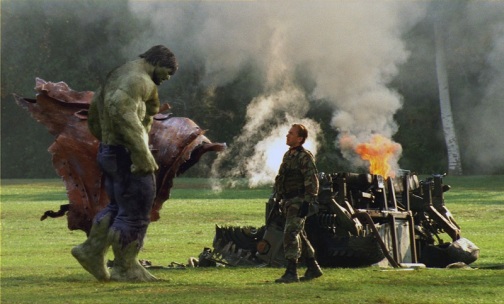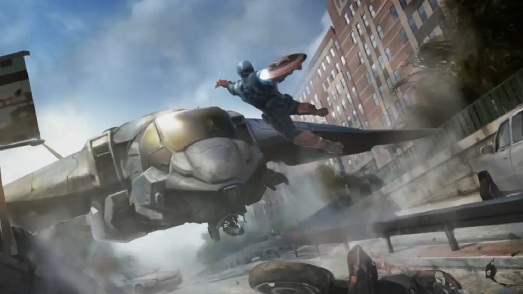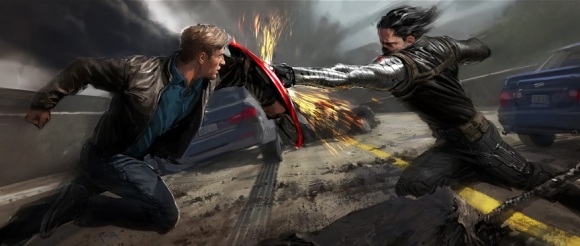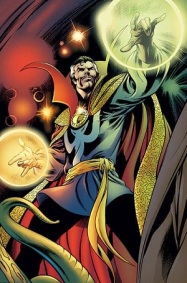
This is the movie I’ve been waiting for since the moment I saw Tim Roth’s Emil Blonsky hyped up on a bastardized super soldier serum and going toe-to-toe with the eponymous green goliath in 2008’s The Incredible Hulk. At that time, the prospect of a Captain America film existed only as internet rumor. A longtime Marvel comics fan with no particular investment in the Cap character, I’d followed speculation with a detached interest. However, as I watched the diminutive Roth dodge, duck, dip, dive, and discharge firearms into the face of his enormous foe, I suddenly realized the potential of the franchise. If superhuman agility could be depicted on film so believably, Captain America could be cinematic gold. Giant, destructive rage monsters are viscerally satisfying. Flapping capes and lightning hammers are movie magic. High-tech battle armor is just plain cool. But the human body operating at peak levels is more mesmerizing than them all. There’s a reason we’re fascinated by sporting competitions like the Olympics. A Marvel film truly capitalizing on the promise of Cap’s abilities could captivate its audience in a whole new way. The First Avenger flirted with these possibilities, giving us glimpses at what might be achievable under the paradigm. The Winter Soldier grabs them by the balls.

The Winter Soldier (TWS) is, without a doubt, the best action movie I’ve seen in years. From locomotion to combat to his incredible strength, Cap’s physicality is captured spectacularly; his power, speed, and prowess are superhuman but utterly believable. Obvious CGI and wire-fu rarely break the illusion. The melee choreography and execution is brisk, immediate, and inventive—the freshest I’ve enjoyed since the debut of the Bourne franchise—and utilizes unique elements like Cap’s shield and the Winter Soldier’s cybernetic arm in creative ways. The action sequences are also thoroughly convincing. Many of them trade the high-flying superhero theatrics of The Avengers for the much more tactile, grounded milieu of the super spy: laser beams for bullets, gods in the sky for tactical boots on the ground. TWS is in this way, as well as in its plot, not entirely unlike an epic Bond film—if 007 had an actual conscience, a sufferable personality, and the ability to take down an armed jet singlehandedly while equipped with nothing but a trash can lid.

As thrilling as it is, the film has much more going for it than adrenaline jolts and eye candy. Its screenplay is tight and purposed, avoiding the obvious plot holes and contrivances that plagued some of Marvel Studios’ earlier outings. While still maintaining breathing room for its cinematic universe’s trademark humor, it takes on a noticeably more somber and reflective tone than its predecessors. This darker edge stems in large measure from the movie’s political thriller/espionage slant, and its blatant statement about current real-world socio-political concerns. Where Marvel’s previous installments have been largely escapist in nature, TWS turns Cap’s world upside down and plunges him right into the middle of a timely freedom vs. security dialectic. The presentation of its ideas can be a bit heavy-handed at times, but superhero comics have never been the subtlest medium. In fact, Marvel’s books have rarely shied away from social commentary, and the brand’s effort to carry forward that legacy into its films is a positive step so long as they maintain the integrity of their stories. TWS works because the statements it makes are absolutely true to the character of Captain America. Should that authentic personhood ever be sacrificed on the altar of political posturing, Marvel will have jumped the shark.
In addition to its taut and engaging plot, TWS also raises the bar on the fantastic character work we’ve come to expect from Marvel Studios projects. The film brings Steve Rogers firmly into the modern era without compromising his ethical center while simultaneously amping up the pathos of his “man-out-of-time” status. Chris Evans’ exudes honest conviction in the part despite the moral ambiguity that surrounds him, and his sharp jaw and clear gaze (not to mention that herculean physique) embody the fearsome heart of the character as fully as ever. The Black Widow gets a remarkable amount of attention, and the film is in many ways as much hers as the Captain’s. Her arc toward transparency is relatively compelling and allowed me finally to appreciate Scarlett Johansson in the role. Marvel is undoubtedly testing the waters for a solo Widow film. Personally, I’m all-in for some Nikita-style super-powered spy games.

Speaking of spy games, Nick Fury also gets a chance to shine here. That characteristic Sam Jackson swagger readily encapsulates the untouchable arrogance of the SHIELD commander who is directly tested this time around. The possibilities birthed by where the film leaves him are very exciting. New to the stage, Anthony Mackie’s Falcon is a brilliant interpretation of an arguably silly comic character. Writing him as a special forces veteran was a genius move, making the immediate connection between him and Cap credible and almost necessary. Even without a wealth of screen time or an origin story proper, the character fits plausibly into the narrative, and Mackie’s warm, human performance is undeniably endearing. If I had a single disappointment leaving the theater, it was only that tight pacing didn’t allow for more exploration of the internal motivations of the story’s antagonists. Sebastian Stan’s role is a quiet and well-formed one, but his intense eyes and haunted demeanor begged for a deeper look.

TWS may not be the most unpredictably original story ever told, but I’m not sure that’s ever been Marvel’s M.O. Instead, their embrace of the sheer fun of cinema has led them to one of if not the best film in their lineup to date (this from a professed Whedonite). It’s an unabashed love letter to superhero comics and feels as important and relevant as any other film I’ve seen in the last year. If you’ve ever enjoyed a Marvel Studios movie, TWS is a can’t miss.
[STINGER SPOILER TO FOLLOW] TWS was chock full of easter eggs for the attentive fanboy. Of them all, the one that most excites me is the passing reference to Stephen Strange as one in a list of legitimate, high-level threats. For those completely out of the loop, Stephen is none other than the hero and Sorcerer Supreme, Doctor Strange. While speculation about a Doctor Strange film has been simmering for years, this mention is the first official confirmation that the character exists in Marvel’s cinematic universe. Is this a hint towards the studio’s plans for Phase 3 or 4 of their interconnected saga?

More interesting than the question of if/when, however, is the question of integration. Doctor Strange is a character steeped in mysticism and the occult, in magical rituals and alternate planes of reality. How does a character like that make sense in a world constructed around the tropes of weird science? Alien Asgard is one thing, but incantations and sojourns in demonic realms are another. We may get our first peek at Marvel’s approach to this dilemma with the introduction of Scarlet Witch in next year’s Avengers sequel, Age of Ultron. The powers of the crimson clad female hero, first revealed on film in TWS’s mid-credits stinger, have always had an obscurely mystical component.


